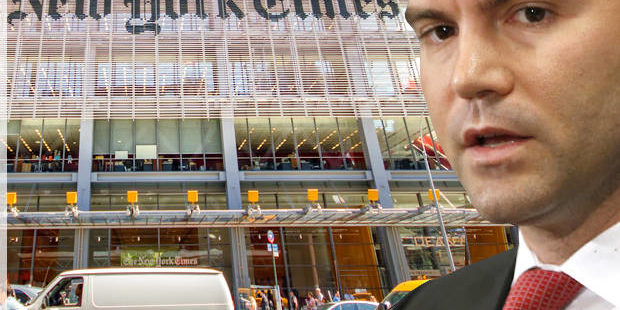
Did the New York Times just accidentally tell the truth about the Obama administration?
A startling piece pulls back the curtain on how our foreign policy is created — and sold to willing media dupes
Historians so inclined will have a blast when their turn comes to dissect the Obama administration and its people. I do not mean the old-line “presidential historians,” story-telling hagiographers such as Stephen Ambrose or the insufferable David McCullough. Obama will have to wait a while for somebody of this set to embalm him to take what place he might among our mythologized tenants of the White House.
Nor do I think we will get much of interest out of those writing of the more immediate past, the journalists who purport to cross over into history. Lou Cannon, Jon Meacham—no. These guys are into painting impastoed pictures of Reagan and George H.W. respectively to make them look as if they were actually as large as the job. This is not what we want.
We want educated judgment—admittedly hard to find when our commanders-in-chief are tucked in between hard covers. We are finishing up eight years of a very complex presidency—a truth one can sign on for regardless of one’s judgment of the man and his two terms. A good historian will need training in semiotics, the science of signifiers, to understand what has occurred during this presidency. To get Obama down right, he or she will have to explore the amazing extent to which spectacle is supposed to supplant political reality, the “narrative” of events called upon to matter more than events.
Prompting these thoughts is a remarkable piece published in the New York Times Sunday Magazine’s May 8 edition. It is a profile, months in the making, of Ben Rhodes, the president’s deputy national security adviser and the man in charge of representing—key term—Obama’s foreign policy. Rhodes is an interesting figure, as I will explain for the sake of those who do not already know this. The whole of this long, weirdly jaunty article is here.
Wade through, and do not let the bag-of-tricks prose distract you. You might be as astonished as I to find the Times lifting the lid so unguardedly on just how our foreign policies are packaged and then sold to us—the Times and other front-rank media being the Fuller Brush men of the story. I sometimes refer to the paper that published this piece as “the government-supervised New York Times.” Doubt it no longer if ever you did: You can read all about it now in said newspaper.
*
Rhodes has had a curious presence since he crept quietly into the news reports a few years ago. He was next to Secretary of State Kerry all through the negotiations with Tehran to limit its nuclear program to peaceful purposes. When the White House suddenly announced that 15 months of secret talks with Havana had produced an agreement to reopen relations, Rhodes turned out to be a key participant in the proceedings. We now learn he is some kind of doppelganger who “has achieved a ‘mind meld’ with President Obama” such that he knows his boss’s thoughts even while the president is not finished thinking them.
Rhodes’s story is even stranger when you start at the beginning. It turns out he was an aspiring writer of fiction—keep this thought at your elbow—who tumbled (with a nudge of nepotism) into Washington’s foreign policy cliques. Rhodes had no background or experience in international relations—a blank slate—but he held a pretty handy pen. So he got into speechwriting, and then into the Obama campaign in 2007, and then into a basement office at the White House after the 2008 election, from which he exerts an almost inconceivable measure of influence. Walter Mitty could not have told a less likely tale.
Rhodes’s full title is deputy national security adviser for strategic communications, and you need to know this to understand just who he is and what his unusual ascent toward the pinnacle of power signifies. While he writes Obama’s speeches and fashions the administration’s spin on any given policy, he also sits at summit tables a few chairs down from Obama and runs on the inside track when Kerry is out executing a policy. David Samuels, who wrote the profile, cites two dozen White House sources when he asserts, “He is the single most influential voice shaping American foreign policy aside from Potus himself.”
Journalists often hype their subject as the most important thing since Saran Wrap, and I suspect Samuels has succumbed to the temptation in writing such things. But there is a lot of it in this piece, suggesting the incaution of the eager freelancer out to make a mark with editors. “On the largest and smallest questions alike,” we read, “the voice in which America speaks to the world is that of Ben Rhodes.” Further down, we read that Rhodes and his colleagues see “some larger restructuring of the American narrative” as “our entire job.” And later we find that the mind-melding Rhodes “used his skills to help execute a radical shift in American foreign policy.”
I do not live in Washington and would rather report the Siberian tundra, but I imagine these assertions are sticking in a lot of craws down there this week. Before taking on the thought of some radical policy shift during the Obama years, however, I need to note something else, something that seems to have thrown some of the Washington press crowd instantly into a dither.
A good part of Samuels’ story is intended to show us just how Rhodes operates—“His days at the White House start with the president’s briefing,” etc.—and the point on which he gets fully granular is how Rhodes and his colleagues “shape the narrative.”

